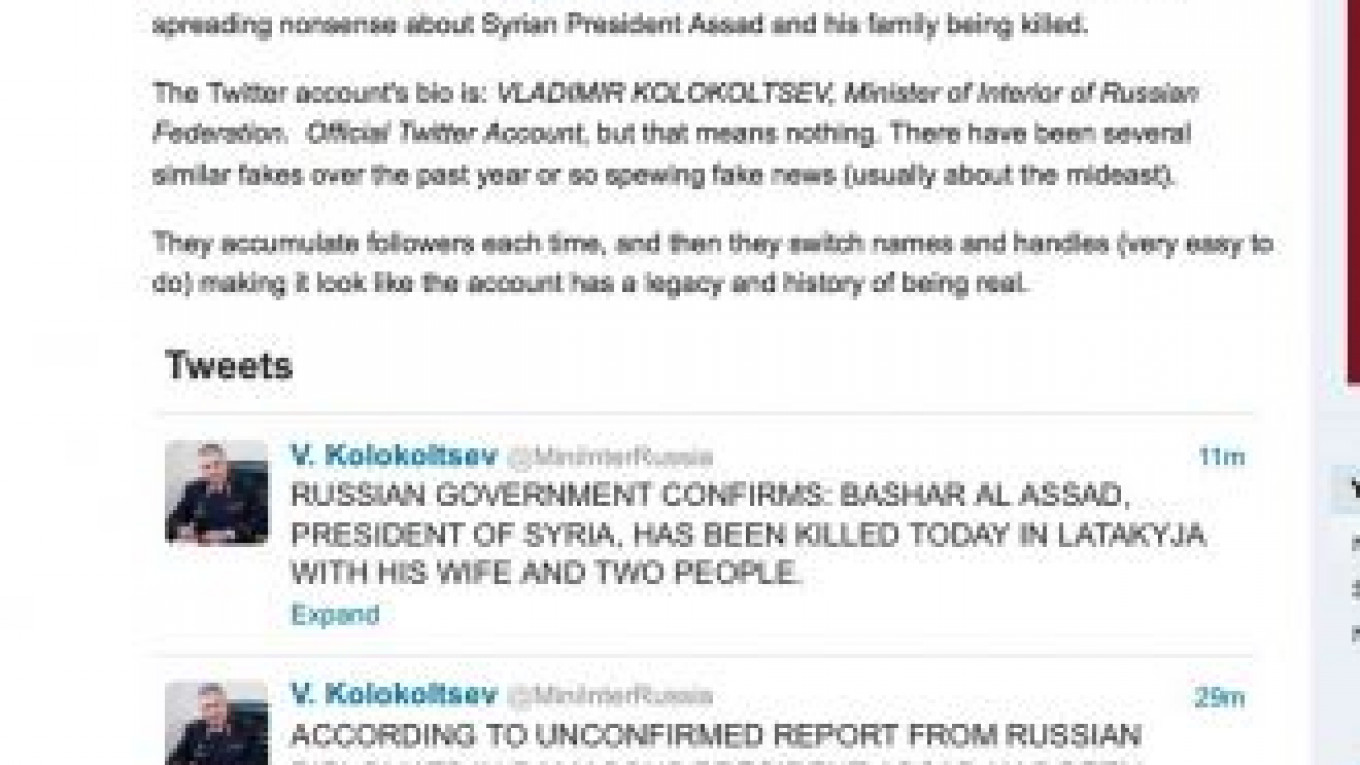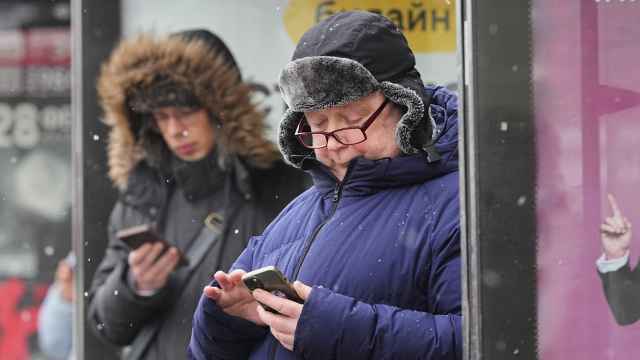Twitter might be a great tool for newsmakers and journalists, but the popular microblogging platform can also wreak havoc by spreading disinformation.
The world was reminded of this Monday, when an account pretending to be Interior Minister Vladimir Kolokoltsev’s sent oil prices climbing by claiming that Syrian President Bashar Assad had been killed.
“Russian ambassador in Damascus reports that President of Arab republic Syria Bashar al Assad has been killed or injured,” the account @MiniInterRussia tweeted at 5:59 p.m. Moscow time, followed by tweets that claimed the news had been confirmed by the Russian government.
The account had been removed Tuesday, but screenshots of the tweets remain online.
Although no serious media outlet gave credence to the information and the Interior Ministry said in a that Kolokoltsev had no account in any social network, somehow the tweets managed to scare enough oil traders and caused a spike in prices in early U.S. trading. Between 10:15 a.m. and 10:45 a.m., futures for light, sweet crude rose from $90.82 to $91.99 a barrel on the New York Mercantile Exchange, Dow Jones reported.
And prices remained high on Tuesday, with Brent trading at $110.90 per barrel, more than $1 above Monday’s price.
Analysts said the spoof was successful by exploiting widespread nervousness about the escalating fighting in Syria and fears that Iran, a major oil producer and backer of Assad, would react.
“The fact that traders are so nervous about events in the Middle East, including Iran, and the potential for a disruption to oil exports from the region, is reflected in the fact that Brent is even higher today and despite the fact that yesterday’s story was proven to be untrue,” Chris Weafer, chief strategist at Troika Dialog, said in e-mailed comments Tuesday.
Only hours before the Kolokoltsev hoax, Interfax ran a story based on a fake Twitter account for Ramzan Kadyrov that said the Chechen leader had called the members of the Pussy Riot punk band, currently on trial in Moscow, “swine.”
One hour later, the news agency ran a correction in which Kadyrov’s spokesman, Alvi Karimov, points out that Kadyrov has not publicly commented on the trial and that his only official account is @RKadyrov, and not @KadirovRussia, which the original story had quoted.
Kadyrov joined Twitter in June, and one of his reasons might have been the growing amount of fake accounts pretending to be him, among them
@PAM3AHrussia, which has almost 2,000 followers and @RamzanKadyrov, which pops up when his name is searched in the English spelling.
Fake accounts have been a staple for Twitter users worldwide, and Russia is no exception.
Among the country’s most popular fake accounts is @SurkovRussia, which has almost 20,000 followers, most of whom probably know that this account is merely making fun of Deputy Prime Minister Vladislav Surkov, who rose to fame as the country’s top political spin doctor while serving as the Kremlin’s point man on domestic affairs until December.
Twitter says on its pages that it “proactively verifies accounts on an ongoing basis” but that it concentrates on “highly sought users” in key interest areas. The company also says accounts impersonating other users “in order to confuse or deceive” can be permanently suspended.
High follower numbers should not be taken as a proof of real identity. A recent study by U.S.-based security firm found that follower numbers can be bought on eBay, with an average price for 1,000 being $18.
And despite Twitter's surging popularity, authorities have been slow to display accounts on official websites. Even the government does not list its official account @Pravitelstvo_RF on its site.
President Vladimir Putin, known for his dislike of the Internet and social media, only inherited the official @KremlinRussia account from his tech-savvy predecessor Dmitry Medvedev, while the semi-official accounts @PutinRF and @Putin2012 are neither verified nor linked on his official websites.
And while @KremlinRussia has more than half a million followers, it is rivaled by @KermlinRussia, which at 375,000 followers ranks as the country's biggest political spoof account.
When Belarussian media reported two weeks ago that Olympics Committee boss Alexander Zhukov criticized Britain on Twitter for not letting Belarussian President Alexander Lukashenko travel to the London games, many reacted with suspicion, given that Zhukov was known to Twitter users only from a spoof account, @zhukovalexander.
However, Zhukov's press team later confirmed the account @AlexDZhukov was real by referring to a tiny notice on United Russia's State Duma faction website.
A Message from The Moscow Times:
Dear readers,
We are facing unprecedented challenges. Russia's Prosecutor General's Office has designated The Moscow Times as an "undesirable" organization, criminalizing our work and putting our staff at risk of prosecution. This follows our earlier unjust labeling as a "foreign agent."
These actions are direct attempts to silence independent journalism in Russia. The authorities claim our work "discredits the decisions of the Russian leadership." We see things differently: we strive to provide accurate, unbiased reporting on Russia.
We, the journalists of The Moscow Times, refuse to be silenced. But to continue our work, we need your help.
Your support, no matter how small, makes a world of difference. If you can, please support us monthly starting from just $2. It's quick to set up, and every contribution makes a significant impact.
By supporting The Moscow Times, you're defending open, independent journalism in the face of repression. Thank you for standing with us.
Remind me later.







